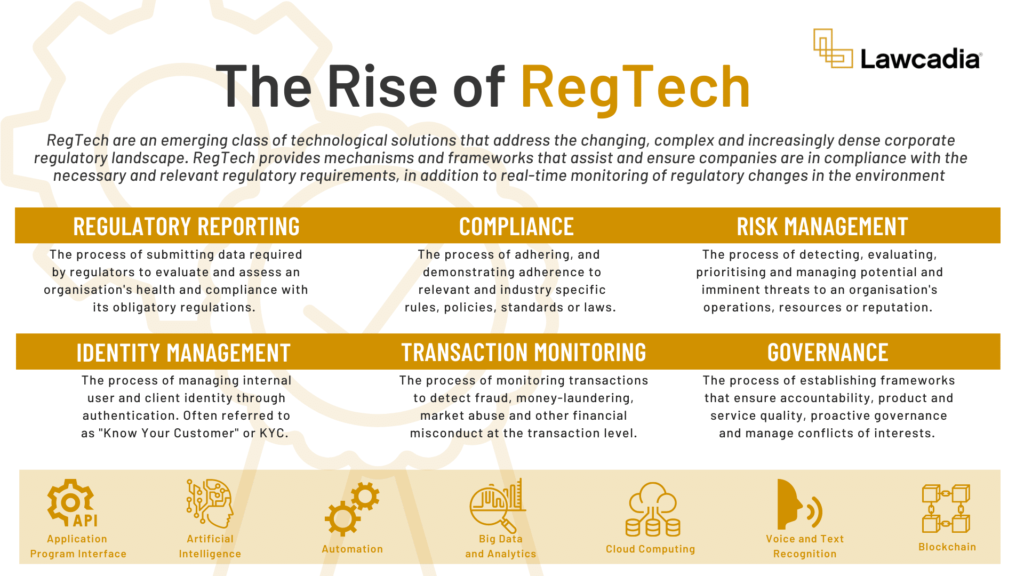Regulation Technology, commonly known as RegTech, are a class of technological solutions that address the changing, complex, and increasingly dense corporate regulation landscape. Increased emphasis on social consciousness, corporate social responsibility (CSR) and a dependency on consumer trust for growth has led to rigorous regulatory action that focuses on customer outcomes and interests, aiming to hold organisations and their leaders to greater account.
In this first instalment of our three-part RegTech Series, we explore the growth of RegTech in industry and how it can be used by in-house legal teams to enhance several functioning areas of an organisation’s operations.
What is RegTech?
RegTech refers to any technology that assists with, and ensures that, companies are in compliance with any and all relevant and industry specific regulatory requirements. Further to this, RegTech can also allow near-real-time monitoring of regulatory changes in the environment that enables efficient, standardised and transparent reporting and enforcement processes. According to Deloitte, RegTech solutions fall into the following distinct categories:
- Regulatory reporting
- Compliance
- Risk management
- Identity management
- Transaction monitoring
- Governance
Categories and descriptions of RegTech solutions

In 2018, a report by Thomson Reuters revealed that a new regulatory update is implemented globally every 7 minutes. The effects of this rapid increase in regulation were reflected in the Association of Corporate Counsel Chief Legal Officers Survey 2021, where:
64% of CLOs anticipate that the volume of regulations in their industry will further increase within the next 12 months.
61% of CLOs expect industry-specific regulations to pose the biggest threat for their organisation in the coming months.
Consequently, industry specific regulation and compliance are the top concern of Chief Legal Officers (CLOs) in most global regions, resulting in the adoption and implementation of RegTech to safeguard against audits, reduce costs and avoid reputational damage. Whilst these are the obvious advantages of RegTech, some additional benefits include:
- Increased efficiencies
- Greater accuracy and comprehensiveness
- Greater internal alignment
- Improved risk management
- Reduced administration and compliance costs
- Increased responsiveness
- Real-time monitoring
Conclusion
Overall, RegTech exists and has become important in assisting organisations to navigate an increasingly complicated and saturated regulatory environment. The proliferation of regulation in industry has surpassed what manual processes can effectively manage without being at risk of non-compliance and reputational damage. As such, RegTech can enable, and should be implemented to streamline regulatory reporting, compliance monitoring and risk management processes. Used in combination with workflow automation and intake tools, RegTech can further support legal operations, demonstrate proactive governance, and enhance the role of the legal department.
Read more of the RegTech Series below:

